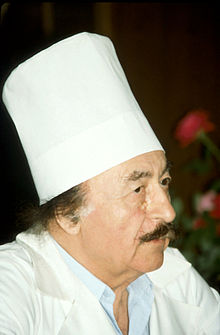Gavriil Abramovich Ilizarov
| Gavriil Abramovich Ilizarov Гавриил Абрамович Илизаров |
|
|---|---|

Gavriil Ilizarov
|
|
| Born |
15 June 1921 Białowieża, Poland |
| Died | 24 July 1992 (aged 71) |
| Education | Crimea Medical School |
| Known for | Ilizarov apparatus for lengthening limb bones |
| Medical career | |
| Profession | Surgeon, Physician |
| Institutions | KNIIEKOT |
| Specialism | Orthopedic surgery |
| Notable prizes | Lenin Prize (1979) |
Gavriil Abramovich Ilizarov (Russian: Гавриил Абрамович Илизаров; 15 June 1921 – 24 July 1992) was a Soviet physician, known for inventing the Ilizarov apparatus for lengthening limb bones and for the method of surgery named after him, the Ilizarov surgery.
Ilizarov was born a sixth child to a poor Jewish peasant family in Białowieża, Polesie Voivodeship, Poland. Shortly before his birth, the family moved to the parents of his mother in Białowieża from the town Qusar in Azerbaijan, near Qırmızı Qəsəbə. His father, Abram Ilizarov, was a Mountain Jew from Qusar, Azerbaijan, while the mother, Golda Ilizarova, was of Ashkenazi Jewish ancestry. Soon after Gavriil's birth, the family moved back to Qusar, where he grew up. He graduated from Buynaksk Medical Rabfac (an educational establishment set up to prepare workers and peasants for higher education) in 1939 and entered the Crimea Medical School in Simferopol. After the outbreak of the Great Patriotic War in 1941 the school was evacuated to Kyzylorda in Kazakhstan. After finishing the school in 1944 Ilizarov was sent to a rural hospital in Dolgovka, a village in Kurgan Oblast in Siberia, 2000 km east of Moscow. In 1950 he obtained a position within a General Surgery Department of the Kurgan Regional Hospital which included a duty as a surgeon with the air ambulance. In 1955 he became Chief of the Department of Trauma and Orthopaedics in the Regional Hospital for War Veterans in Kurgan.
...
Wikipedia
